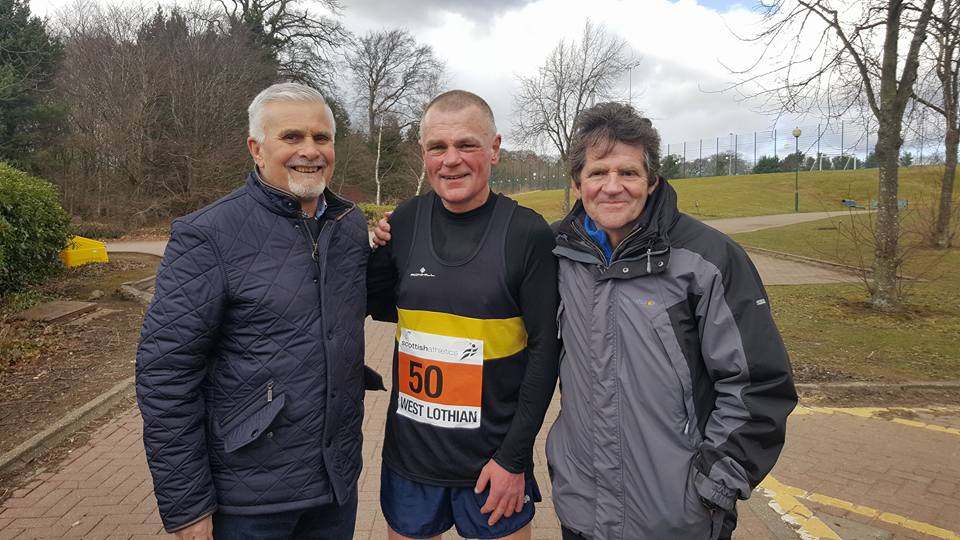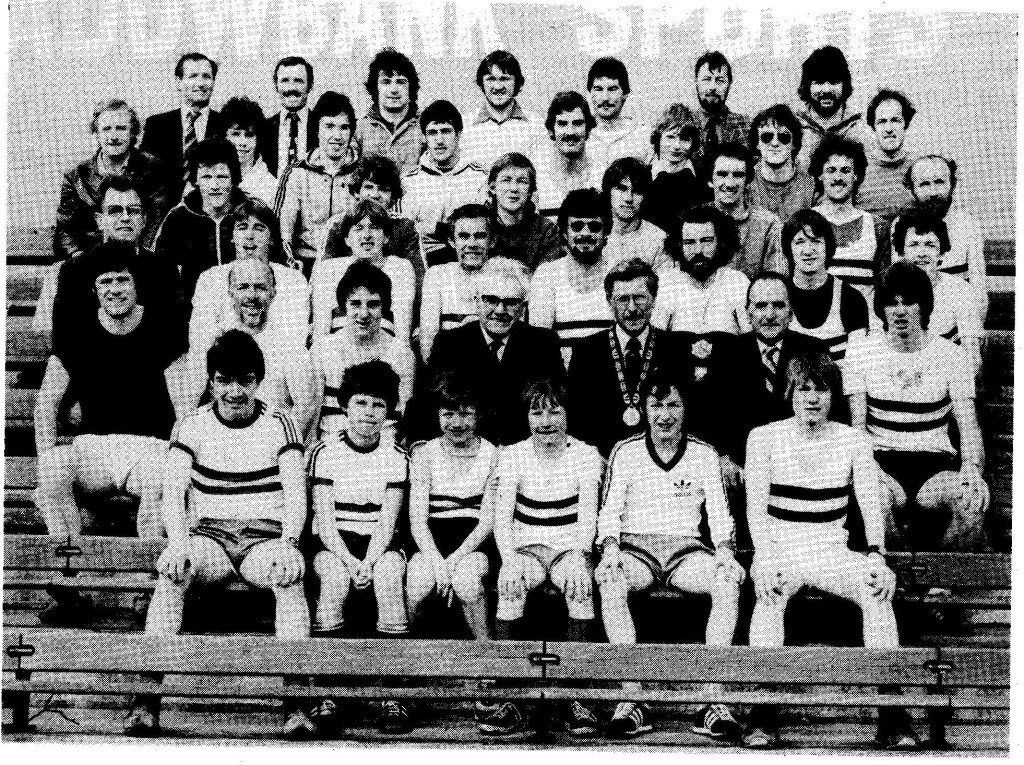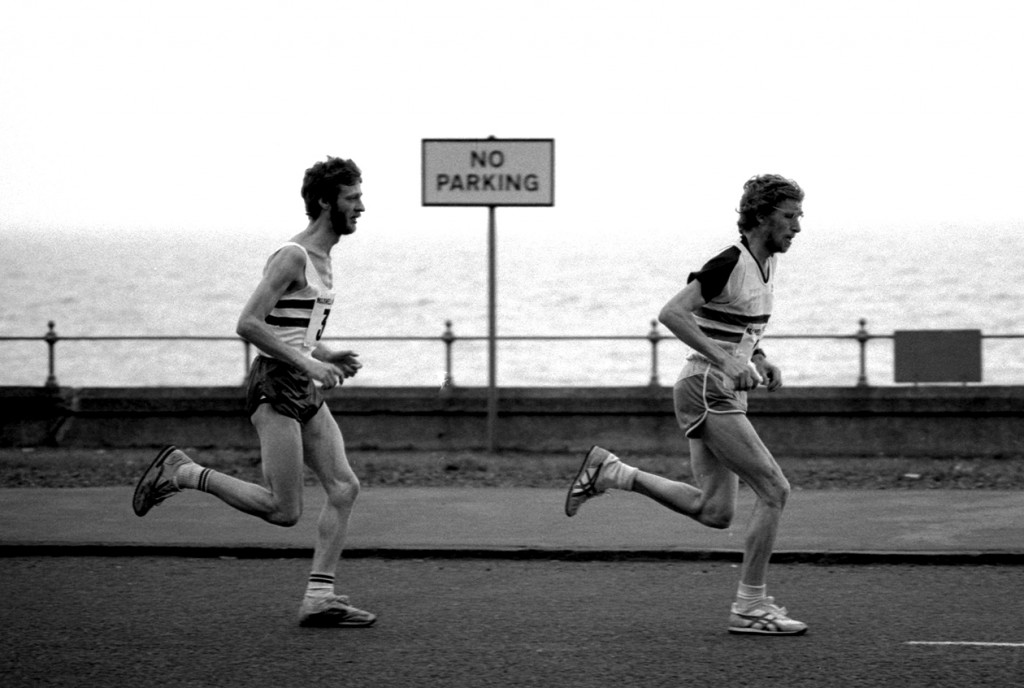
Ian McKenzie, John Gladwin and Alex Robertson
Ian McKenzie is a man who has represented his club, Edinburgh Southern Harriers as a runner on the road and over the country, as a team manager and as an administrator since the early 1960’s. Ian was club secretary from 1969-’71 and from ’84-’94, and president from ’75-’77. Never a champion, he was a good, reliable, dependable athlete who ran –
- in road races in Highland Games at such as Airdrie,
- in the point to point road races, such as the 16 miles Clydebank to Helensburgh, which were always popular well contested races,
- and in the annual classics like the Nigel Barge Road Race held on the first Saturday every year in Glasgow.
- in club, district and national cross-country championships representing Edinburgh Southern Harriers
- in track races for the club in the Scottish Athletics League as well as in individual events.

Ian completed the questionnaire for us and it is reproduced verbatim below. Ian says:
Name: Ian B McKenzie
DOB: 15/11/1940
Occupation: Retired
Club/s: Edinburgh Southern Harriers/ City of Edinburgh A C.
P.Bs: 880-2.04, 1 mile-4.16, 3 miles-14.52, 6 miles-29.56,half marathon-64.48,marathon-2.28. All achieved a long time ago!
When I was a boy of 12 I lived near Meadowbank and ran there with friends. I was approached by an ESH coach, Willie Denholm, and asked if I was interested in joining as he felt I had the ability to be a reasonable runner. At that time there was no organized competition for that age group, formal events started at 14, but the club had a number of boys who met to be given coaching and advice on training. Because of this I was able to enjoy success in school sports at a variety of events, then moved on to club competition.
The greatest thing I got from the sport was lifelong friendships with fellow club members and those from other clubs.
There were a number of performances that I would give equal standing. I always considered myself more a team member than someone who could say they were a good individual. As there can only be one winner in an event I think that most have to be content with the knowledge that you gave the best you could give. Because of this opinion I think my personal best performances were as a part of teams eg. second team in the AAAs 12 stage relay, winning teams at the SCCU champs, the best individual race was breaking 50 mins at the Tom Scott ( strong tailwind)!
As I said earlier the friendships and the sheer pleasure of going for a daily run well into my 70s.
When I started running, training was still twice a week with a race on a Saturday. In the early 1960’s this all changed for distance runners with the methods of Arthur Lydiard being introduced i.e. long slow distance. This meant a Sunday run of 20 miles then varying distances and speeds throughout the week with the aim of running a minimum of 70mpw. I was fortunate enough to be able to train most lunch times along with club colleagues. Monday 6 miles fartlek, Tuesday 8/10 miles club run, Wednesday fartlek, Thursday track 20 x400m with one lap jog, a total of 10 miles, Friday steady 8/10 miles.
It was always open to variations, such as paarlauf or sprints, depending on weather or how you felt.
My proudest moment was when ESH won both the Ladies and Men’s Pye Gold Cups at Crystal Palace, the first time this had been achieved by any UK club, also finishing second on consecutive years at the AAAs 12 stage road relay 1974/1975.
I never qualified as a coach or official, but advised many athletes over many years, using my own knowledge and experience achieved over decades of involvement in the sport.
Throughout a long time I held many administrative roles within Club athletics with ESH and City of Edinburgh namely: ESH c/c team manager throughout the 1970/ 80s when we were, in my opinion, the leading team in Scotland. After the amalgamation with EAC in 1996, I held the post of BAL track team manager and took us from Division 3 to Division 1 in consecutive years. I was ESH President in 1975 and Secretary/Treasurer for a period of 12 years prior to amalgamation.
I was always satisfied in contributing to Club success and never had any desire to achieve higher office.
We also asked Ian for some information about who he trained with, knowing that he and Ken Ballantyne were good friends and this is what he replied –
“Ken and I became good friends and training partners, when he came to Edinburgh in 1958,and remained very good friends until his death. In fact I gave the eulogy at his funeral. He was exactly one month older than me and although he was a much better middle distance athlete than I ever was we could complement each other in the way we trained, the difference was he could race much better than I ever did. In the early days we trained each lunch hour at Meadowbank along with George Brown then later at Inverleith where Fergus Murray would train with us, classes at Fettes permitting, and other Southern members. Donald often joined us when he was home from Dunoon for the school holidays.”
Colin Youngson (ESH) leading Evan Cameron (ESH) in SAAA marathon championship
That is what Ian himself has to say on his career what follows are the thoughts and comments of Colin Youngson who ran for the club when Ian was team manager. He has this to add:
Colin Youngson wrote:
“Ian B. McKenzie. What does the Centenary History of Edinburgh Southern Harriers (published 1997) say about him? Between 1969 and 1971; and again during 1984-1994, he served this outstanding Athletics club as Honorary Secretary. He was President for two years (1975-77). The Centenary publication itself included contributions from a number of excellent officials, all runners: Ken Ballantyne, Ian Clifton, Hamish Robertson, Jim Smart – and Ian McKenzie who, along with Hamish, is described as ‘a main club stalwart’ during the final years before ESH merged with Edinburgh Athletic Club to form City of Edinburgh AC.
But how do I remember him? During 1974 and 1981, we encountered each other very frequently since, on road, cross-country and (occasionally) track, I ran for ESH during ‘Glory Years’, which continued for ESH after I moved from Edinburgh to Aberdeenshire, and competed for Aberdeen AAC and, eventually, Metro Aberdeen Running Club.
For me, Ian McKenzie was a superb Team Manager, who organised, motivated, cheered on and, when necessary, consoled his athletes. I never remember him expressing disappointment or negative criticism. Everyone respected and admired Ian. He was not ‘just’ a club official but a really good friend – and a vital force behind winning teams.
Ian McKenzie was well-dressed and neatly bearded, an upbeat fellow who wore ‘cool’ tinted specs. He had a sense of humour, communicated clearly and shared our sporting ambitions. He was only a few years older than most of us – one month older than gritty Martin Craven – and really understood about pre-race nerves, during-race stress and post—race knackeration! We celebrated together.
There was much to celebrate! Edinburgh Southern Harriers were a top club, not only in Scotland but also in Britain. I had little to do with track triumphs but, during my time racing with ESH, was fortunate that club-mates were so talented, hard-training and successful. Consequently, I shared in ten Scottish Championship team triumphs: four Edinburgh to Glasgow Road Relays; three Six-Stage Road Relays; two Senior National Cross-Country Championships; and one Scottish Cross-Country Relay. Not to mention many wins in East District Championships, plus prestigious relays like the McAndrew, Kingsway, Scally – and our own Fernieside. One real highlight was a narrow defeat – a closely-contested silver medal in the 1975 English 12-Stage Road Relay, against the cream of Sassenach outfits. And, in season 1978-1979, ESH won every major road and cross-country team race in Scotland (apart from West District etc): the Grand Slam or Clean Sweep, which merited an Edinburgh Civic Reception.
On this website, under The Importance of Clubs, I list these ESH team victories, along with the names of all runners concerned. We always knew that Allister Hutton was especially important and that John Robson had more talent than the rest of us together. But how much did Ian McKenzie contribute? An immense amount. We have a lot to thank him for; and share so many good memories.”
Ian McKenzie: Runner Ian McKenzie: Team Manager Ian McKenzie: Team Manager, an evaluation


